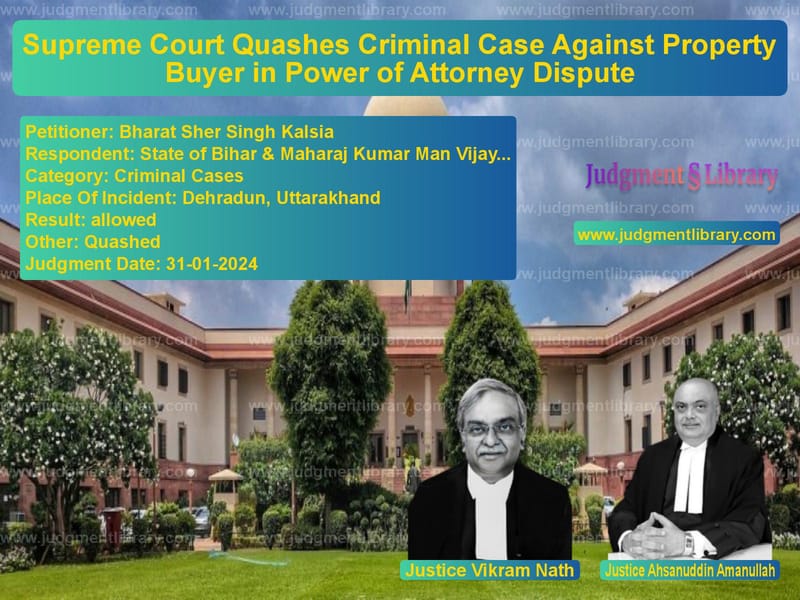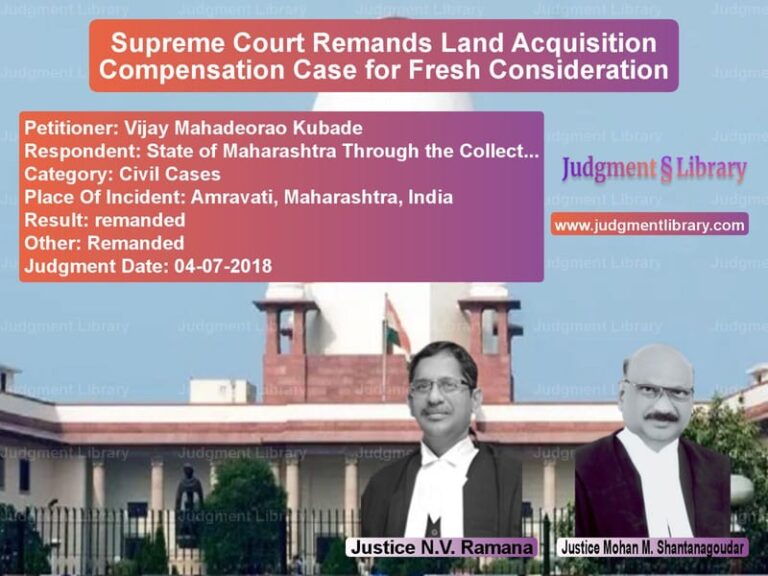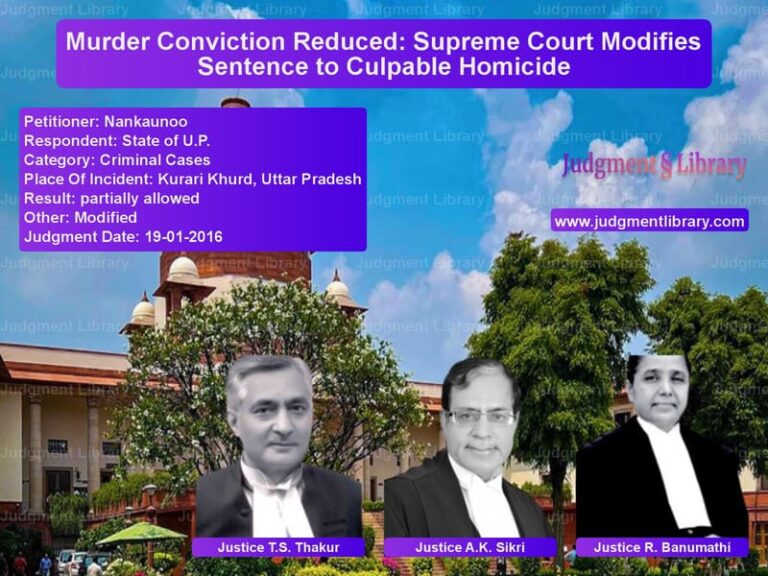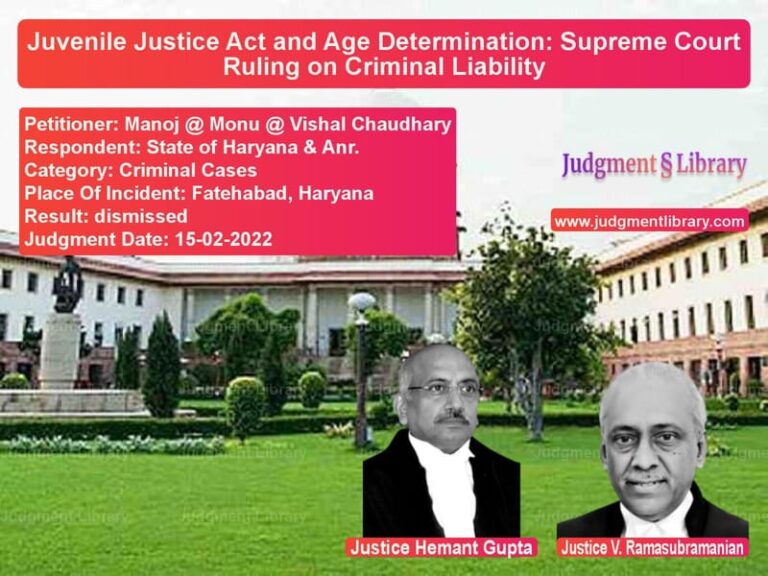Supreme Court Quashes Criminal Case Against Property Buyer in Power of Attorney Dispute
The Supreme Court of India, in a significant judgment, quashed the criminal case against Bharat Sher Singh Kalsia, who had purchased land from a power of attorney (PoA) holder. The case revolved around allegations of forgery and misrepresentation by the seller, leading to a criminal case that dragged the buyer into litigation. The Court ruled that the dispute was civil in nature and that the buyer could not be held criminally liable.
Background of the Case
The dispute arose from the sale of property in Dehradun, Uttarakhand, which was executed by Raj Kumar Karan Vijay Singh under a PoA granted by several family members, including the complainant, Maharaj Kumar Man Vijay Singh. The property, which included multiple khasras, was sold to Bharat Sher Singh Kalsia. The complainant later alleged that the PoA holder had acted fraudulently and sold the property without authorization.
The complainant filed a First Information Report (FIR) at Dumraon Police Station, Buxar, Bihar, alleging criminal offenses under Sections 467, 468, 469, and 471 of the Indian Penal Code (IPC). The police investigation later included Section 420 (cheating) and Section 409 (criminal breach of trust) in the chargesheet.
The trial court took cognizance of the charges, leading the appellant to file a petition before the Patna High Court to quash the FIR. The High Court dismissed his plea, prompting an appeal before the Supreme Court.
Petitioner’s Arguments
Bharat Sher Singh Kalsia, represented by his counsel, argued that:
- He was merely a bona fide purchaser and had no role in the alleged misdeeds of the PoA holder.
- The property sale was executed legally under a valid PoA, which had not been revoked at the time of sale.
- The complainant had filed a civil suit challenging the sale, which had already been dismissed, affirming the legality of the transaction.
- The criminal case was an abuse of the legal process intended to harass him.
- The alleged fraudulent act, if any, was committed in Dehradun, and Bihar courts lacked territorial jurisdiction.
Respondent’s Arguments
The complainant, Maharaj Kumar Man Vijay Singh, contended that:
- The PoA required the signature of the landowners for executing a sale, which was not obtained.
- The appellant willfully participated in the fraudulent transaction.
- Even if the sale deed was valid, the appellant should have verified whether the PoA holder had the authority to transfer the property.
- Since the PoA was revoked later, any sale made under it was questionable.
Supreme Court’s Observations and Ruling
The Supreme Court analyzed the clauses of the PoA and found that:
- The PoA expressly granted the holder the authority to execute sale deeds, receive consideration, and register the transaction.
- The buyer had paid the full consideration for the property.
- The complainant and other landowners failed to prove that the PoA holder exceeded his authority.
- The complainant had already lost a civil case challenging the sale, which affirmed that the transaction was valid.
The Court reiterated that civil disputes should not be given a criminal color and held:
“A civil dispute arising out of a property transaction, particularly one already decided by a civil court, should not be converted into a criminal case unless clear evidence of fraud or forgery is present.”
Key Directives of the Supreme Court
Based on the findings, the Supreme Court quashed FIR No. 87 of 2011, along with all related proceedings, including the trial court’s cognizance order. The Court also stated:
- The trial court may invoke Section 319 of the Criminal Procedure Code (CrPC) to summon the appellant if new evidence justifies such action.
- Territorial jurisdiction for the case lay in Dehradun, not Buxar, Bihar.
- The dispute between the landowners and the PoA holder, if any, should be pursued through civil litigation.
Significance of the Judgment
The Supreme Court’s decision establishes crucial principles regarding property transactions and criminal liability:
- Bona fide buyers are protected: Purchasers who acquire property through valid means should not be subjected to criminal cases merely due to disputes between the seller and third parties.
- Civil and criminal laws must not be misused: Courts should ensure that civil disputes do not turn into criminal harassment.
- Territorial jurisdiction is critical: Criminal complaints must be filed in the appropriate jurisdiction.
- Power of Attorney transactions require scrutiny: Buyers should exercise due diligence in verifying PoA conditions before purchase.
This judgment reinforces that criminal proceedings should not be misused to settle civil property disputes and provides a safeguard for genuine property buyers against wrongful prosecution.
Petitioner Name: Bharat Sher Singh Kalsia.Respondent Name: State of Bihar & Maharaj Kumar Man Vijay Singh.Judgment By: Justice Vikram Nath, Justice Ahsanuddin Amanullah.Place Of Incident: Dehradun, Uttarakhand.Judgment Date: 31-01-2024.
Don’t miss out on the full details! Download the complete judgment in PDF format below and gain valuable insights instantly!
Download Judgment: bharat-sher-singh-ka-vs-state-of-bihar-&-mah-supreme-court-of-india-judgment-dated-31-01-2024.pdf
Directly Download Judgment: Directly download this Judgment
See all petitions in Fraud and Forgery
See all petitions in Contract Disputes
See all petitions in Property Disputes
See all petitions in Judgment by Vikram Nath
See all petitions in Judgment by Ahsanuddin Amanullah
See all petitions in allowed
See all petitions in Quashed
See all petitions in supreme court of India judgments January 2024
See all petitions in 2024 judgments
See all posts in Criminal Cases Category
See all allowed petitions in Criminal Cases Category
See all Dismissed petitions in Criminal Cases Category
See all partially allowed petitions in Criminal Cases Category







